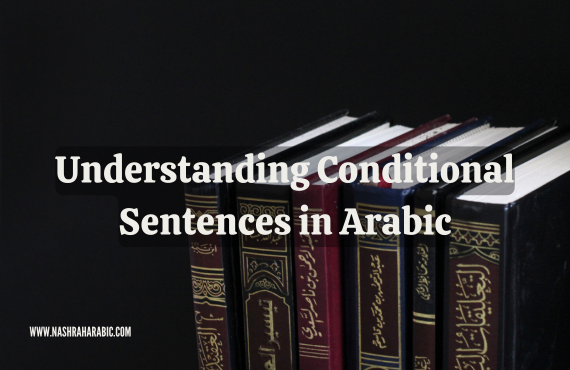Conditional sentences are a crucial part of any language, allowing us to express possibilities, hypotheses, and consequences. In Arabic, conditional sentences (الجمل الشرطية) are both fascinating and essential for effective communication. Whether you’re a student of the language or simply curious about its structure, mastering conditional sentences will enhance your fluency and understanding.
Introduction to Conditional Sentences
Conditional sentences are used to describe situations that are dependent on certain conditions. In Arabic, these sentences are formed using specific particles that introduce the condition, followed by a result or consequence.
What are Conditional Sentences?
Conditional sentences are sentences that express a condition and its outcome. They are composed of two parts: the if-clause (or condition clause) and the main clause (or result clause). For instance, in the sentence, “If it rains, the ground will be wet,” “If it rains” is the condition, and “the ground will be wet” is the result.
The Structure of Conditional Sentences in Arabic
In Arabic, conditional sentences typically consist of a conditional particle followed by the conditional clause and the result clause. The structure may vary slightly depending on the type of conditional sentence, but this basic format remains consistent.
Key Conditional Particles in Arabic
The most common particles used to form conditional sentences in Arabic include:
- إذا (Idhā) – Used for real conditions, similar to “if” in English.
- إن (In) – Also used for real conditions, often in more formal contexts.
- لو (Law) – Used for unreal or hypothetical conditions, similar to “if” in English but with a sense of impossibility or improbability.
Types of Conditional Sentences in Arabic
Arabic conditional sentences can be broadly categorized into real and unreal conditionals, each serving a distinct purpose in communication.
Real Conditional Sentences
Real conditional sentences describe situations that are likely or possible. They use particles like إذا and إن. An example is, “إذا درستَ، ستنجحُ” (Idhā darasta, satanjah) – “If you study, you will succeed.”
Unreal Conditional Sentences
Unreal conditional sentences express hypothetical situations that are unlikely or impossible. The particle لو is often used here. For example, “لو كنتُ طائراً، لطرتُ بعيداً” (Law kuntu ṭā’iran, laṭartu baʿīdan) – “If I were a bird, I would fly away.”
Examples of Conditional Sentences in Arabic
Let’s break down some examples to see how these sentences function:
- إذا جاء أحمد، سنذهب إلى السوق (Idhā jā’a Aḥmad, sanadhhab ilā al-sūq) – “If Ahmad comes, we will go to the market.”
- لو كنتُ غنياً، لَسافرتُ حول العالم (Law kuntu ghanīyan, lasāfartu ḥawl al-ʿālam) – “If I were rich, I would travel around the world.”
Common Mistakes to Avoid
One common mistake learners make is confusing the particles إذا and إن with لو. Using the wrong particle can change the meaning of the sentence or make it grammatically incorrect. Practice is key to mastering their correct usage.
The Role of Context in Conditional Sentences
Context is crucial when forming and understanding conditional sentences in Arabic. The choice of particle and the structure of the sentence can vary depending on the situation being described.
Conditional Sentences in Arabic Literature
Conditional sentences are frequently used in Arabic literature, from classical poetry to modern prose. They add depth and complexity to the narrative, allowing writers to explore hypothetical scenarios and their potential outcomes.
Practical Tips for Using Conditional Sentences
- Start Simple: Begin by practicing with real conditional sentences before moving on to the more complex unreal conditionals.
- Pay Attention to Agreement: Ensure that the verb forms in the condition and result clauses agree in terms of tense and subject.
- Practice with Examples: The more you use conditional sentences, the more natural they will become.
Conditional Sentences vs. Hypothetical Sentences
While conditional sentences describe conditions and their outcomes, hypothetical sentences often deal with purely imagined scenarios. In Arabic, لو is a key particle for forming hypothetical sentences, but it’s important to differentiate them from other conditional forms.
The Impact of Conditional Sentences on Meaning
The use of conditional sentences can significantly alter the meaning and tone of a conversation or text. They allow speakers and writers to introduce uncertainty, possibility, and hypothetical thinking into their communication, making them a powerful tool in the Arabic language.
Conclusion and Final Thoughts
Understanding conditional sentences in Arabic is essential for anyone looking to master the language. These sentences not only allow you to express a wide range of ideas and scenarios but also enhance your overall fluency and comprehension. By practicing with real and unreal conditionals, and paying attention to the context in which they are used, you can become proficient in using these versatile sentence structures.
FAQs
What are conditional sentences in Arabic?
Conditional sentences in Arabic are sentences that express a condition and its outcome, often introduced by specific particles like إذا or لو.
How do real conditional sentences differ from unreal ones in Arabic?
Real conditional sentences describe likely or possible situations, while unreal conditional sentences describe hypothetical or impossible scenarios.
What particles are used in Arabic to form conditional sentences?
Common particles include إذا (Idhā) for real conditions, إن (In) for formal real conditions, and لو (Law) for unreal or hypothetical conditions.
Can you give an example of a conditional sentence in Arabic?
Sure! “إذا ذهبتَ إلى السوق، ستشتري الفواكه” (Idhā dhahabta ilā al-sūq, satashtarī al-fawākih) – “If you go to the market, you will buy fruits.”
How important is context in forming conditional sentences in Arabic?
Context is very important as it dictates the choice of particle and the overall structure of the sentence, ensuring that the intended meaning is conveyed accurately.
By mastering conditional sentences in Arabic, you’ll gain the ability to express complex ideas and hypothetical scenarios with clarity and precision, making your communication in the language richer and more nuanced.
Join us on Youtube !




